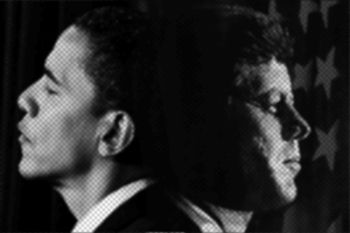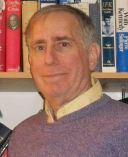
Publisher:
Bonnie King
CONTACT:
Newsroom@Salem-news.com
Advertising:
Adsales@Salem-news.com

~Truth~
~Justice~
~Peace~
TJP
Jan-20-2011 00:00

 TweetFollow @OregonNews
TweetFollow @OregonNews
What President Obama Can Learn From President Kennedy
Opinion by Marc Schulman for Salem-News.comPresident Obama would do well to take the lessons learned from President Kennedy to heart.
 Obama and Kennedy. Courtesy: neorepublica.com |
(NEW ROCHELLE, NY) - January 20th marks the 2nd anniversary of the inauguration of President Obama. It also marks the 50th anniversary of the inauguration of John F. Kennedy as the 34th President of the United States.
A quick comparison between Kennedy and Obama reveals many similarities: both are young; both first of their peer group elected to the Presidency; both with glamorous wives; and both having authored two bestselling books before becoming President.
There are also, of course, tremendous differences between the two, both in terms of experience: President Kennedy had been in Congress as a Congressman and Senator of 14 years before being elected, while President Obama had been in the Senate a mere four years prior to his election (although he had served in the state legislature.) President Kennedy was a war veteran and hero. JFK grew up in both privilege and with direct exposure to the rich and powerful.
President Obama grew up without those experiences, and of course, as much as President Kennedy’s election as the first non-Protestant to be elected US President, it has hard to compare the election of a privileged Catholic to the Presidency, to that of the first African American. Though 50 years later, it is easy to forget how groundbreaking the election of the first Catholic seemed.
President Kennedy and Obama have taken very different approaches to The Art of the Presidency. President Obama has taken the approach that the key to Presidential success lies in making the correct policy decision; once the right policy decision is made, all else flows in place. President Kennedy, on the other hand, believed that the right decision was only one part of any solution.
President Obama would do well to learn from the insights highlighted by the “weaknesses in the institution of the Presidency” understood by JFK.
First, one could not just assume that orders given would be carried out. Second, the Presidency was just the first among three co-equal branches of government. Third, one of the greatest dangers in a Presidency comes, not from hearing too many diverse voices, but from only hearing only what one wants to hear. Finally, President Kennedy understood that a President's popularity could easily be swayed by how newspapers, (or, now, television), last reported about what he had said or done. President Kennedy made deliberate and mostly successful efforts to overcome all these weaknesses.
President Kennedy's daily schedule, shows that he met with subordinate government officials and overwhelming number of times. Not only did Kennedy meet regularly with the members of his Cabinet-- the Secretaries of all the government agencies--, but JFK met regularly meet with his Under-Secretaries, Ambassadors, both US and Foreign, the Chairman of the Joint Chiefs, and the heads of the other services, (other senior military officers, such as the Chief of Naval Operations or the Commanders of the Strategic Air Command.)
President Kennedy’s methods of direct leadership may not always have been the most efficient way to operate, but they virtually guaranteed the President's views could not be misconstrued or misinterpreted, since a variety of officials, at all levels were hearing his message directly from the President himself.
President Kennedy understood that significant power was created through the development of personal relationships. That was what he sought to do. Relationship-building abroad was essential to President Kennedy, considering that the US was deeply involved in the Cold War; a war that required winning over the hearts and minds of nations throughout the world.
President Kennedy also understood that he would need the support of the other two branches of government to accomplish his agenda. From the very start of his Presidency to the week before he was assassinated, JFK was constantly wooing the Congress, and to a lesser extent the Judiciary. President Kennedy would have weekly breakfast meetings with Legislative leaders at the White House to coordinate the actions of the Executive and Legislative branches. He sponsored a Congressional coffee hour or reception at least once or twice each month. During these sessions JFK would invite groups of Senators and Congressmen to socialize at the White House.
There was hardly a day that President Kennedy was at the White House in which he did not meet with a key Senator or Congressman to discuss one matter or another. The same was true of the Judiciary. The night before President Kennedy left for his fateful trip to Texas he held a reception for the Judiciary, attended by the Supreme Court Justices, their wives and members of the lower courts. In fact, Kennedy saw the Supreme Court as an ally in his fight to change the country.
When Kennedy came to office he felt he could not introduce large scale Civil Rights Legislation. Kennedy felt he had to satisfy himself with results that could be achieved by executive orders. But by his third year in office, he introduced the far ranging Civil Rights legislation that would be passed after his assassination. By then the time was right, his popularity was high and his support in Congress had grown.
President Kennedy also understood he needed to deepen his relationship to the Press. He met at least once or twice a week with key journalists, off the record. Kennedy further made sure the Press felt he was accessible to them, and through them to the American People. In just under 35 months as President, Kennedy conducted a total of 64 full-fledged press conferences. In contrast, President Obama has hosted nine Press Conferences in his first 23 months as President.
Twice a month, on average, the President hosted a luncheon for newspaper editors and publishers of different states. No state was too small for the President's systematic effort to win over the nation's Press. Though the times have no doubt changed, President Kennedy did not have to deal with the Internet or Cable TV, nor did he have to deal with elements of the media that are hostile to his Presidency, as certain members of the media are hostile to the Obama Presidency. However President Obama has not courted the media in the same ways President Kennedy successfully courted them.
Finally, President Kennedy was never willing to rely solely on those people who reported to him. Kennedy was constantly seeking input from outside of the White House orbit. He would meet regularly with businessmen, such as Thomas Watson, Jr. from IBM, or scientists, like Dr. Edward Teller or major Union figures, such as Walter Reuther from the United Auto Workers. Of course, it was always a two-way street, as Kennedy also sought to influence those with whom he met. President Obama has had formal meetings with select business leaders and other similar groups, but he has not forged the one-on-one relationships that President Kennedy developed. He has yet to be seen as able to step out of the White House bubble.
President Obama would do well to take the lessons learned from President Kennedy to heart. It could make the difficult job of the Presidency somewhat more navigable.
 Marc Schulman, Historian, is the primary editor of Historycentral.com the largest history web site. Marc has taught history to a very wide range of schools from Middle School to Colleges. He received his BA and MA from Columbia University. Marc has authored 20 CD Roms on American and World History, including a multimedia biography of JFK written almost 20 years ago. The URL for Marc's new book; JFK a 50 Year Retrospective, is JFK History Maker- a 50 Year Retrospective.
Marc Schulman, Historian, is the primary editor of Historycentral.com the largest history web site. Marc has taught history to a very wide range of schools from Middle School to Colleges. He received his BA and MA from Columbia University. Marc has authored 20 CD Roms on American and World History, including a multimedia biography of JFK written almost 20 years ago. The URL for Marc's new book; JFK a 50 Year Retrospective, is JFK History Maker- a 50 Year Retrospective.
He was one of the earliest developers of applications for the iPhone and iPad and his company MultiEducator now has 40 apps on sale on Apple’s ITunes Store, including 10 history apps. Over 2,000 people a week download his free app called the Constitution and Federalist Papers. Marc lives in Mamaroneck New York with his wife and children. You can send Marc an email at this address: marc@multied.com
Articles for January 19, 2011 | Articles for January 20, 2011 | Articles for January 21, 2011

Quick Links
DINING
Willamette UniversityGoudy Commons Cafe
Dine on the Queen
Willamette Queen Sternwheeler
MUST SEE SALEM
Oregon Capitol ToursCapitol History Gateway
Willamette River Ride
Willamette Queen Sternwheeler
Historic Home Tours:
Deepwood Museum
The Bush House
Gaiety Hollow Garden
AUCTIONS - APPRAISALS
Auction Masters & AppraisalsCONSTRUCTION SERVICES
Roofing and ContractingSheridan, Ore.
ONLINE SHOPPING
Special Occasion DressesAdvertise with Salem-News
Contact:AdSales@Salem-News.com
Salem-News.com:


googlec507860f6901db00.html
Terms of Service | Privacy Policy
All comments and messages are approved by people and self promotional links or unacceptable comments are denied.
Timothy D. Naegele January 21, 2011 1:07 am (Pacific time)
Kennedy was a fraud, pure and simple, as I have discussed in an article entitled, "John F. Kennedy: The Most Despicable President In American History." See http://naegeleblog.wordpress.com/2010/10/04/john-f-kennedy-the-most-despicable-president-in-american-history/ The problem is that the Kennedy family members and sycophants have been burying the truth since his assassination, and it needs to be told. When he died, his “image” was frozen in time, but the truth is grotesque. To lionize him like his sycophants have done is a crime, and unconscionable. The latest travesty is Caroline Kennedy's successful distortion of the truth by forcing the History Channel to drop its already-completed min-series about Kennedy and his wife, starring Katie Holmes and Greg Kinnear.
[Return to Top]©2026 Salem-News.com. All opinions expressed in this article are those of the author and do not necessarily reflect those of Salem-News.com.